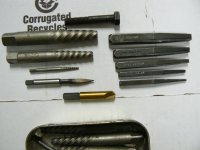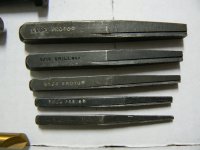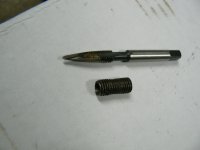This is why I specifically mentioned the Dormer ones; using a very steady but very slowly increasing turning force, you can actually feel them start to twist

It's at that point you stop turning!
Every other brand I have tried have indeed snapped without warning - even top brands like 'Snap-On' have failed in this way.
During one Bahraini summer while outside in the relentless heat and humidity, a colleague snapped a bolt while removing an igniter plug on a jet engine.
Another lad then attempted to remove stub of the bolt but then snapped the easy-out extractor off in the bolt!.
...It was then left to me to use some very small diamond-encrusted grinding tips - a bit like dentists tools - to try and grind out the broken extracor and the bolt.
It literally took me all day to do it - picking bits of metal out of the hole with forceps and a scribe as I made progress, but I saved myself from having to do an engine-change not to mention the fact jet flew the next day!
I arrived back at the apartments that evening in great need of a shower, to find the other engineers and the aircrew sitting around the pool swigging beer, cheering me as I arrived back!


Yup, Dormer - Dormer Pramet as I believe they now are? - are the absolute dogs whatsits in terms of quality and I agree with all you are saying here but I would argue that you are only going to develop that "feel" for when "twist" becomes "snap" with experience of using the tools?
D'you know?, I must be one of the few mechanics I know who has never bought a Snap On tool! Most of my stuff was Britool (the high quality old stuff - I believe today's Britool tools are a somewhat different "animal"?) with a sprinkling of better quality German stuff mixed in.
Here's a wee "pick and mix" from the tobacco tin which holds my screw extractors:

The ones on the left are indeed Dormers which feature the usual left handed twist. The fluted ones on the right are a set of Protos I bought when I went tool shopping with a chap I know in Southern Maryland, a very interesting fellow who was my daughter's neighbour and was rebuilding a Mk1 Corvette. I spent many happy hours neglecting my grandchildren helping him in his lovely large garage/workshop. Oh how I envy him that garage!
Here's a close up of the Protos:

As you can see they have no reverse thread. As I'm sure you'll know Max H, but for the benefit of others, you use them by drilling a hole into the stud in just the same way as with the Dormers (better quality tools of this type will have the recommended drill size on their shank). Then you tap the tool into the hole with a hammer until it's flutes bite into the stud. The only comparison I would make between them, and both work well enough, is that if you have a very tight stud then I find the reverse screw type (like the Dormers) will screw themselves more and more deeply into the hole. The unfortunate outcome of this is that it spreads the stud and tends to lock it even more firmly into the hole! rather like a Timesert. The fluted design doesn't do this and I think I slightly prefer them - not much in it though.
I once made one out of an old thread tap to remove a bit of broken screw from a carburettor. It's the one at the bottom of the 1st picture - here's a close up, including the bit of stud:

Must be over 30 years ago, wonder why I kept the bit of stud? In fact that was a one off, I've never used it on another one.
I also have a couple of things that look like the end of a reverse cutting drill - there's one at the bottom of the first picture. The idea is that if you have a damaged Allen screw head (or similar) the reverse twist will bite into the head and get enough of a grip to unscrew it. I picked them up at an autojumble. No idea of the make. They were in a tatty cardboard box and look brand new. In fact they still do as I've never had reason to use them!
Interesting to hear of your Your Bahraini experience I've, luckily, never had to deal with this type of scenario. I've also heard of spark erosion but I've never seen it in use. I can well imagine how slow and laborious grinding it out must have been to say nothing of the heat, sounds like my idea of hell. My brother in law was a pilot with BEA (Trident and BAC111's mostly) who in later years saw his time out with Cyprus Airways largely as a training captain, so they lived in Cyprus. We had some really lovely family holidays out there but I remember well the blast of heat which hit you as you exited the aircraft to walk down the steps! After that we mostly went in spring or autumn. We've also spent quite a bit of time in Southern Maryland where, in the height of summer, you either live indoors, in the car, or wandering around Malls, all air conditioned, because it's just so darned hot outside. Can't even begin to imagine what working outside, probably on a concrete apron? in the height of summer in somewhere like Bahrain would be like! Hope you were quickly supplied with a beer that evening?






